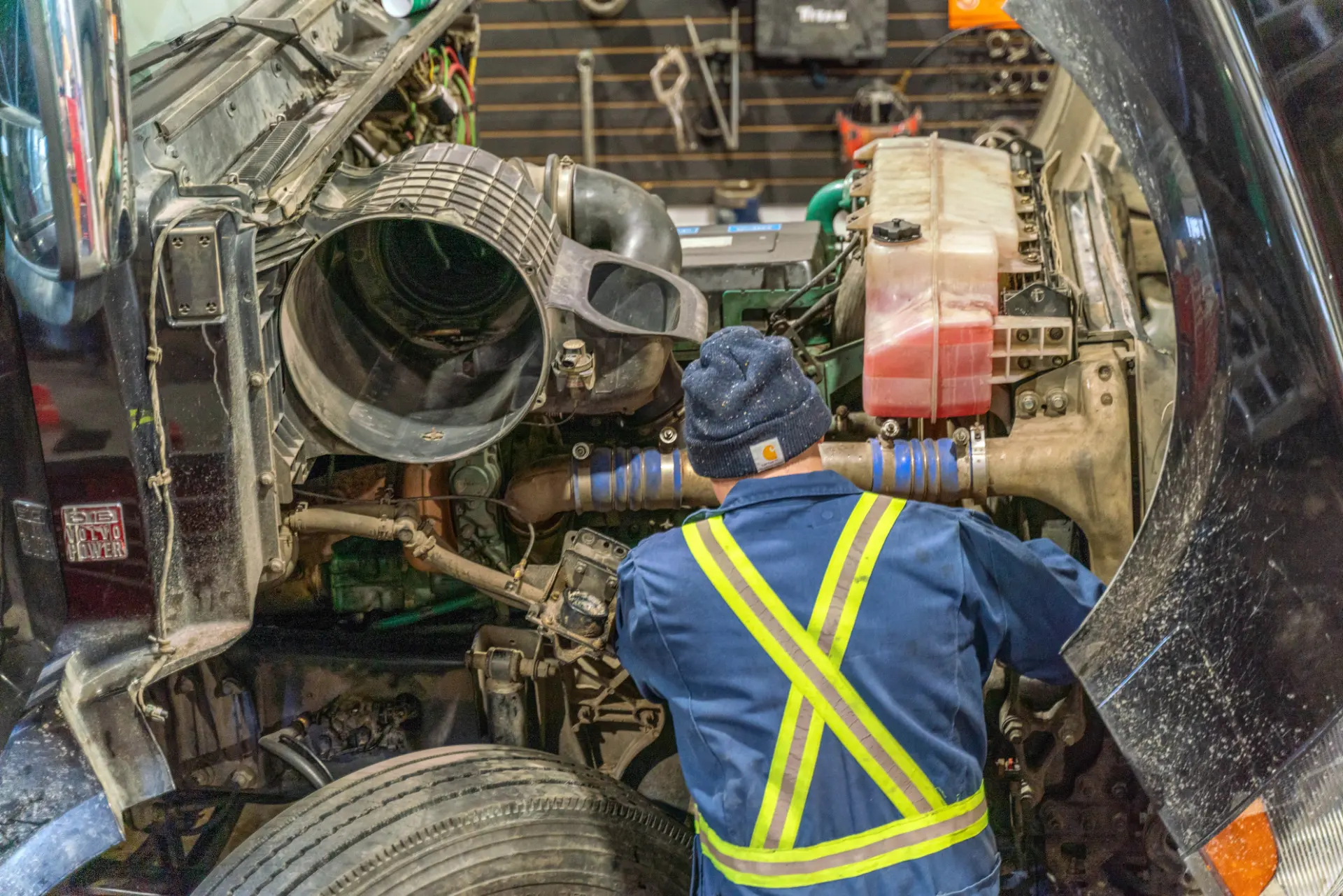Fleet Repair & Maintenance: Optimizing Your Heavy-Duty Trucks for Uptime & Profitability
Prevent breakdowns & boost profits! Learn how proactive fleet maintenance can save your company money, improve safety & keep your trucks on the road. Fleetgo Heavy Duty Inc. offers expert maintenance & repair solutions. pen_spark

Imagine one of your drivers got stuck on the side of the highway, waiting hours for a tow truck while their crucial delivery is delayed, costing your company money and reputation. Unfortunately, this scenario is all too common for many fleet managers. Vehicle complexity, unscheduled repairs, and parts delays are increasing maintenance costs significantly. However, by prioritizing preventive maintenance, you can reduce downtime, minimize repair expenses, and keep your fleet operating at peak efficiency. This article by Fleetgo Heavy Duty Inc. will equip you with the strategies to optimize your heavy-duty truck maintenance program for maximum uptime and profitability.
The Importance of Regular Maintenance
Regular maintenance is the cornerstone of fleet management. By adhering to a strict maintenance schedule, you can prevent costly breakdowns and extend the lifespan of your vehicles. This proactive approach not only keeps your trucks running smoothly but also enhances safety and fuel efficiency.
Why is Preventive Maintenance Critical?
Preventive maintenance involves regular inspections and services to catch potential issues before they escalate into major problems. Key aspects of preventive maintenance include:
- Regular oil and fluid checks: Ensuring that your engine oil, transmission fluid, and other essential fluids are at optimal levels and free from contaminants.
- Tire inspections: Checking for proper inflation, tread wear, and alignment to prevent blowouts and improve fuel efficiency.
- Brake system evaluations: Inspecting brake pads, rotors, and air systems to ensure they function correctly and safely.
- Software updates: Keeping your ECM (Engine Control Module) and other computerized systems up-to-date to improve performance and diagnostics.
Reactive vs. Proactive Maintenance
Reactive Maintenance
This approach involves making repairs only after a problem occurs, which can often result in unexpected breakdowns and higher overall costs due to emergency servicing and parts sourcing. Often termed as a "fix-it-when-it-breaks" approach, reactive maintenance contrasts sharply with proactive maintenance strategies. In reactive maintenance, actions are taken only after a failure has occurred, which can lead to unexpected breakdowns and potentially high repair costs. This method can disrupt operations, as it typically results in longer downtimes while parts are sourced and repairs are made.
Advantages of Proactive Maintenance
Proactive maintenance, or preventive maintenance, involves regular inspection and the timely servicing of vehicles to prevent problems before they develop. This approach is essential for reducing breakdowns and maintaining continuous fleet operations. Key aspects include:
Scheduled Inspections and Maintenance: Regular inspections and maintenance are crucial. Aligning these with manufacturer recommendations and adapting them to the specific needs of your fleet helps in the early detection of potential issues, ensuring safety checks, and maintaining overall vehicle health.
Comprehensive Maintenance Strategies: Creating a preventive maintenance schedule that includes engine oil changes, tire rotations, brake inspections, fluid checks, lubrication, and filter replacements can significantly extend the life of a vehicle and enhance its performance.
Key Components to Monitor For Your Fleet Trucks
Understanding and monitoring key components of your heavy-duty trucks is essential for maintaining optimal performance and preventing breakdowns.
Diesel Engine Maintenance
Diesel engines are the heart of your trucks, and maintaining them is critical. Regularly checking and replacing engine oil, filters, and coolant can prevent overheating and reduce wear and tear on internal components. Additionally, keep an eye on the following:
- Cylinder: The chamber where fuel combustion occurs.
- Piston: Moves up and down inside the cylinder to create power.
- Crankshaft: Converts the piston's up-and-down motion into rotational motion.
- Fuel Injectors: Spray fuel into the cylinder for combustion.
Transmission Care
Your transmission is responsible for transferring power from the engine to the wheels. Regularly inspecting transmission fluid and gears can prevent issues like slipping or hard shifting. Different types of transmissions require specific maintenance:
- Manual Transmission: Requires clutch adjustments and gear inspections.
- Automatic Transmission: Involves checking the torque converter and fluid levels.
- Automated Manual Transmission (AMT): Combines manual efficiency with automated convenience, requiring both mechanical and software checks.
Driveline Components
The driveline transfers power from the engine to the wheels, and its components must be in top condition to ensure smooth operation:
- Driveshafts: Connect the transmission to the differential. Regular inspection prevents wear and tear.
- Differentials: Allow wheels to rotate at different speeds, crucial for turns. Ensure proper lubrication and check for any unusual noise or vibration.
Suspension Systems
Suspension systems support your truck’s weight and absorb road impacts, ensuring a smooth ride:
- Leaf Springs: Simple and reliable but can be uncomfortable without a heavy load.
- Air Suspension: Offers a more comfortable ride with variable strength, adjusting for different load weights.
Quality Fleet Maintenance That Keeps Your Truck Rolling
Embracing a proactive, preventive maintenance strategy is crucial for minimizing downtime and maximizing fleet efficiency. Having a plan and monitoring the essential components of your truck means more control over your vehicle’s breakdown. WithFleetgo Heavy Duty Inc, we’re your ideal partner in establishing a robust preventive maintenance program that ensures your trucks are safe, efficient, and constantly ready for the road. Enhance your fleet's operational efficiency and safety with our expert maintenance and repair services today. If you want to learn more about truck maintenance, check out our article about engine repair to extend your truck’s lifespan.
More Articles

Why Vibration at Highway Speed Often Points to Driveline Problems

Why Uneven Brake Wear Signals Bigger System Issues

Early Signs of Differential Failure in Heavy-Duty Trucks
Contact FleetGo
Get in touch with Fleetgo today to request a quote or to schedule in-shop or mobile services in Edmonton & the surrounding area! Our mobile service extends to a 100km radius around Edmonton for emergency roadside assistance & mobile truck & fleet repairs, including Sherwood Park, Spruce Grove, Fort Saskatchewan, St. Albert, Stony Plain, along Highway 16, & more!


